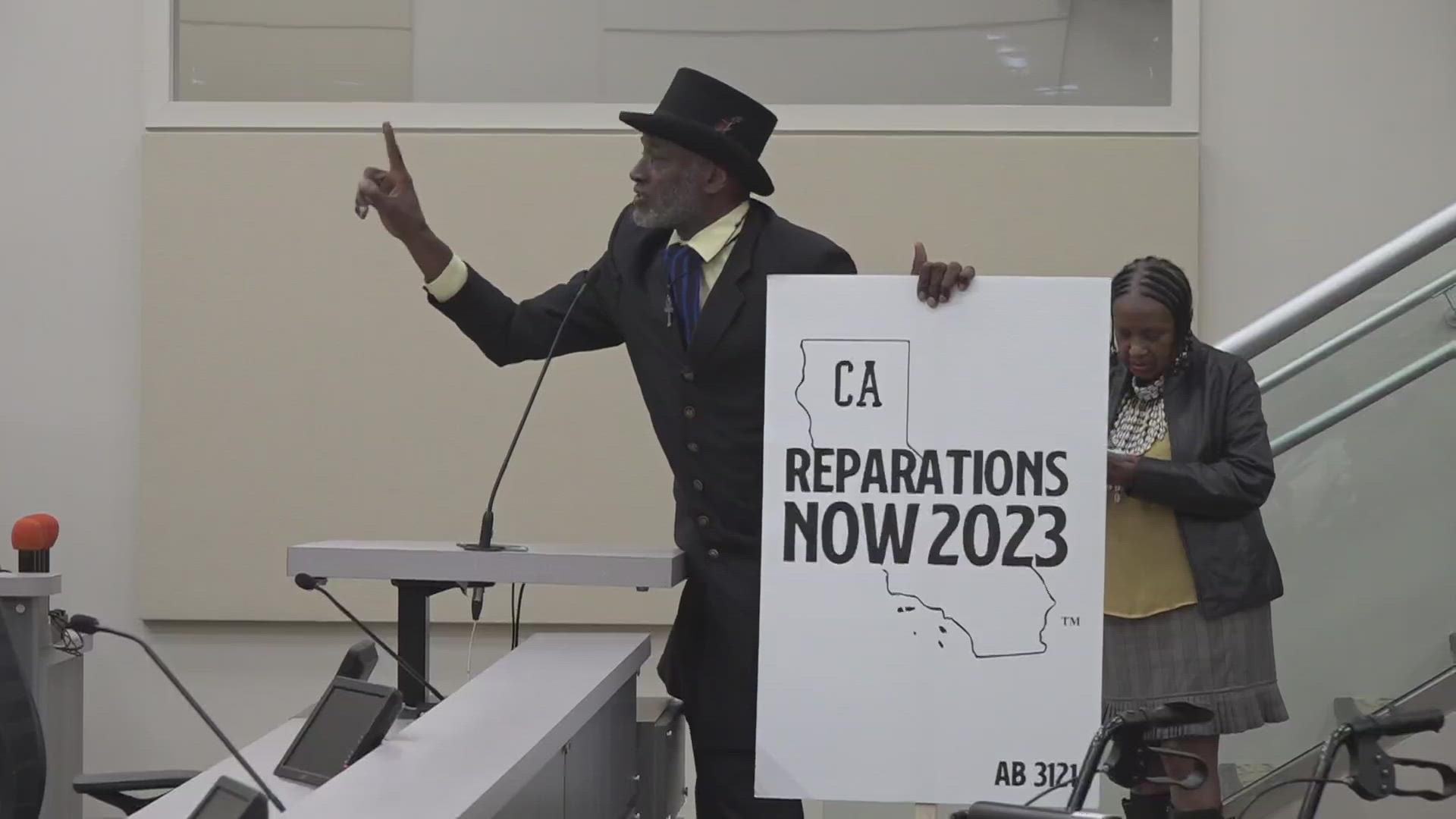SACRAMENTO, Calif. — California's first-in-the-nation statewide reparations task force is meeting Friday and Saturday at the CalEPA building in Downtown Sacramento.
State law passed back in 2020 — Assembly Bill 3121 — created the task force. Members are working on recommendations for state lawmakers on what form reparations should take in the state of California. The goal is to help make amends for the generations of harm to African Americans caused by chattel slavery and its longstanding effects in society.
The California Reparations Task Force has held regular meetings over the past two years, at first all-virtual, but since this past fall, in-person in various California cities. The location of March’s two-day meeting is Sacramento.
Dozens of people lined up to speak in the public comment section Friday morning. They offered various perspectives on how reparations should look for Black Californians.
"Capital. Money. Reparations. That will stimulate this economy for the 2.6 million Blacks in California,” one man said. “There’s only one thing that would stop our children from busting into these liquor stores and grocery stores, stealing junk food and stealing different things, and that’s reparations.”
Another person told the task force, “you can never repay the damage have been done to Black people in America... So I want to be very clear: land, land, land. Healthy land! Not toxic land."
Some commenters called in, with two people raising objections to the whole effort.
"I don't believe a single person deserves restitution in any form unless they are a Native American,” one man said.
"Why is the state of California even doing this? This should be a federal thing, just like they did with the Japanese internment,” a woman commented.
Gloria Pierrot-Dyer came from Roseville to share her family's story. She grew up on a 63-acre farm just outside the historically Black Central Valley community of Allensworth, named for its founder Colonel Allen Allensworth.
“At the time, in the 1950s, it was pretty much an all-Black town... Growing up in Allensworth was an extraordinary experience in terms of being able to see how racism affected an entire town," she said. "The white farmers all around [my dad's farm] had wells. We didn't."
Allensworth was a community built by and for Black people. It thrived in the early 1900s but dwindled in subsequent decades, with a loss of water rights and many leaving for World War II.
“This one white farmer, who was across the road, he had his well. He would water his fields... If he saw us bring our cows out to drink water in the ditch, he would tell us to get them over, back away from water in the ditch,” said Pierrot-Dyer. “That is hatred... I didn't experience the brunt of racism like I would have maybe if I had lived in Mississippi or someplace else, but I saw enough of it to realize the damage that could be done."
When growing up, she said her parents told her about her enslaved ancestors.
"They were treated like animals — only worse,” she said.
She said chattel slavery has done generations of damage. That's why she's advocating for reparations not only in the form of land and money, but also mental health resources.
“There are many who still have not been able to reach anywhere near their potential because of the psychological harm. Even if money, for example, is put in somebody's hands, if the internal issues have not been resolved and healed, that person will go right on doing some pathological thing, possibly,” she said. “Much of this goes back to the legacy of slavery and the psychological harm that was done to African Americans individually and as families.”
At their January meeting, task force members agreed to recommend that the state create the California African American Freedmen Affairs Agency to implement their recommendations and process reparations claims. Those recommendations are due to the legislature in a final report this summer. State lawmakers will still have to vote on any possible reparations.
As for who would be eligible, the task force voted last year that Black Californians who descended from enslaved African Americans or from a free Black person living in the U.S. prior to the end of the 1800s would be eligible for monetary reparations.
The task force’s March meeting continues at 1001 I Street in Sacramento on Saturday, from 9 a.m. to 5:15 p.m. It’s open to the public and anybody is welcome to participate in the public comment section, which is scheduled to start at 9:05 a.m.
WATCH MORE: New California law is limiting the use of rap lyrics as evidence in criminal cases | To The Point



















